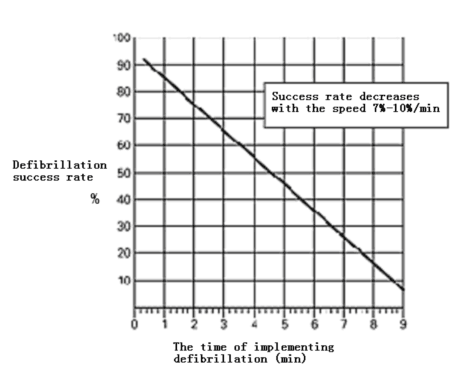FEATURE
Three-step defibrillation process
Two-button operation
Extensive voice and visual prompts for the operator
Continuous event recording for reporting each use to a printer or computer
Weekly self-test to ensure readiness
Biphasic energy output
Lock-out protection to prevent inadvertent defibrillation
FEATURE
Three-step defibrillation process
Two-button operation
Extensive voice and visual prompts for the operator
Continuous event recording for reporting each use to a printer or computer
Weekly self-test to ensure readiness
Biphasic energy output
Lock-out protection to prevent inadvertent defibrillation
SPECIFICATION
Defibrillator
Output: Biphasic Truncated exponential
Energy Sequence: 150, 150, 200J
Charge Time: 8sec. to150J
10 sec. to 200 J(NEW battery)
Analysis Time: 9 sec.
The maximum time from the initation of rhythm analysis to readiness for discharge with a new battery: Less than 30 seconds
The maximum time from the initation of rhythm analysis to readiness for discharge after 6 shocks: Less than 35 seconds
The maximum time from the initation of rhythm analysis to readiness for discharge: Less than 25 seconds
Audible Prompts: 20 audible prompts
Visual Prompts: LED prompts
Controls: Two buttons - On/Off, Shock
Output Energy Accuracy: ±15% into impendance from 25 to 75Ω
The Maximum Voltage: 1200±50V
Output disabled when the patient impedance is outside limits: 20Ω to 200 Ω
Battery
Part No: CR123A-4X2
Non-Rechargeable: 12V DC. 3.0 Ah
Capacity: 100 discharges at 200 Joules or 120 discharges at 150 Joules
Shelf Life (25℃±15℃): 10 years (5 years storage + 5 years standby)
5 years standby (after installation)
Physical
Dimensions: 303 X 216 X 89 mm
Weight: 2 kg
Operating Temperature 0℃ to 40℃
Operating Humidity: Relative humidity between 30% and 95%(non-condensing)
Storge Teperature: -20℃ to 55℃
(without battery)
Storge Humidity: Up to 93%(non-condensing)
(without battery)
Standard Configuration
1 AED 7000 Machine
1 Pair of Pads
2 pcs Batteries
1 pcs Handbag
DESCRIPTION
Automatic External Defibrillator AED 7000,which is a defibrillation
device safe, portable and easy to use, can be applied in family and public place
to give first aid for the sudden death symptom. The defibrillator can analyze the
patient’s ECG, make a judgment for the patient’s cardiac condition and indicate
whether the defibrillation is needed and the defibrillation strength, which not
only enhances the success rate of defibrillation, but also reduces the injury of
defibrillation to heart to the utmost extent. There is low requirement for the
operator to use the device. The defibrillator will guide the operator to carry out
defibrillation treatment via voice prompt step by step, give safety alert if the
occasion arises, and can carry out early defibrillation treatment effectively as
well as protect the operator farthest, being very applicable to the emergency
treatment for the sudden cardiac death patient in family and public place.
Automatic External Defibrillator AED 7000 recognizes ventricular
fibrillation and other ventricular tachycardia and guides operators through the
defibrillation process. When properly connected to a patient who is
unconscious, not breathing, and without a pulse, the Automatic
External Defibrillator AED 7000 analyzes the patient's heart rhythm, provides text and
audio instruction prompts, determines if a shockable situation exists and, if
appropriate, automatically arms the Shock button.
Automatic External Defibrillator AED 7000 delivers the defibrillation
shock through two self-adhesive, pre-gelled, low-impedance electrode
defibrillator pads. The pads, cable, and connector are sold as disposable kits.
A large number of clinical results show that after the sudden cardiac death
happen, carrying out defibrillation treatment in time is the key to increase the
patient’s survival rate, and the defibrillation success rate will decrease with the
speed 7~10%/min.The graph below shows the relation between defibrillation
success rate and the time of implementing defibrillation treatment.

Defibrillation shock energy is usually stored by high power capacitor. The key of
implementing biphasic pulse defibrillation is to control the defibrillation pulse
with high pressure and large current. Our companyadopting advanced control technique, creates a perfect control method of biphasic pulse defibrillation by plenty of experiment research. Combining the research achievement with advanced heart monitoring technique, our company develops a series of cardiac defibrillation monitors of possessing intellectual property.
![1629780455765284.png 3N]M{93PGCYG`H2UPS$P~@0.png](/Uploads/image/20210824/1629780455765284.png)
Contact: Katrina Yao
Phone: +0086 18255652021
Tel: +86 0556-5222292
Email: chuangen.medical@aliyun.com
Add: Area C, Huamao 1958 Project, No.80, South Fangzhi Road, Daguan District, Anqing, Anhui, China.
We chat
